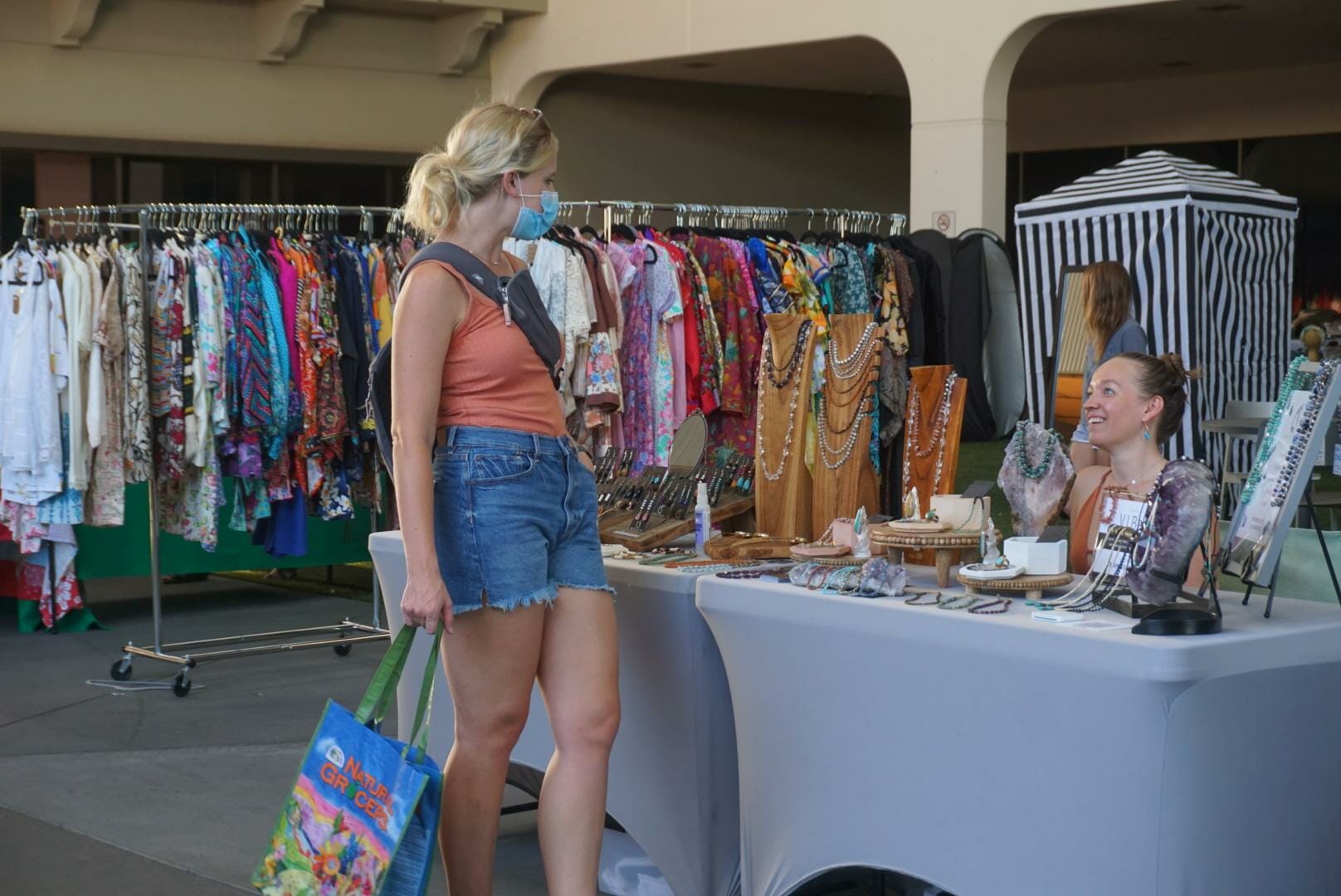The Arizona Sustainable Apparel Association, in partnership with Conscious Collective Co., hosted their first sustainable fashion pop-up shop since the COVID-19 pandemic began on Aug. 28 in Phoenix. The event provided an array of vintage sellers, independently-owned businesses and upcycled clothing shops innovating the future of sustainable fashion.
“We’ve spent the past year really connecting and networking with different local brands,” said executive director of the Arizona Sustainable Apparel Association, Madeline Dolgin. During this time, it connected with Conscious Collective Co., who introduced it to more ethically and environmentally conscious businesses.
READ ALSO: Ranking Arizona: Top 10 consignment shops for 2021
One local business present at the pop-up event on Aug. 28 was Voyce Threads, a “socially conscious lifestyle brand that brings awareness to important causes,” said founder and CEO Drew Shaw. Voyce Threads is partnered with Teach for America Phoenix, Arizona Humane Society, Circle the City and other non-profits.
Shaw said they are creating mismatched socks inspired by their nonprofit partners to initiate dialogue about “the organization that is being represented on your feet.” A portion of the proceeds from the sale of these socks goes back to their nonprofit partners as a donation, Shaw said.
Sustainable manufacturing is a top priority for Voyce Threads as it uses “yarns like recycled cotton and recycled polyester,” said Shaw. He said their manufacturer is also a zero-waste company, so scraps left over from the production process are reused “to make new products that are donated to the community.”
The realm of sustainability digs beyond reworking environmental practices, as it calls for social practices to be evaluated as well. This can be exemplified by fair worker pay, ethical labor practices and philanthropy. Voyce Threads is focused on fulfilling both aspects.

Another vendor present at this event was the Tucson-based company Bralessly, whose mission is to create clothes “for women who want to be comfortably braless and still be modest,” says founder Erica Yngve.
Yngve produces all her clothes at Sonoran Stitch Factory, a Tucson manufacturing company that she owns. Owning her own company allowed further control for Yngve to make her clothes efficiently and sustainably, according to an interview from Shoutout Arizona.
Yngve said that she uses “fabric made with bamboo and modal.” These fabrics have environmental benefits, especially the low water usage during the production of modal fabrics and bamboo’s potential to be biodegradable. They were likely chosen for their breathability and soft silk-like qualities.
Yet, navigating through the emerging world of eco-friendly fabrics has its drawbacks as all materials have the potential to be unsustainable in one way or another. In 2018, the Environmental Protection Agency estimated that Americans disposed of 17 million tons of textile waste, a number that has doubled in the last two decades.
Producing any new products can be unsustainable as that just create more clothes taking up residence in landfills. Reusing and repurposing old clothing materials is an alternative to remaining environmentally conscious.
When she isn’t spending her time working with the Arizona Sustainable Apparel Association, Dolgin focuses on her own upcycle fashion brand Healing Seams.
“I take mostly old pairs of jeans I’ve gotten from friends and family that have ripped and are no longer able to be worn, and I find creative ways to repurpose them into new garments,” Dolgin said.
Her showcased designs made with recycled denim ranged from overalls to vests and everything in between.
Dolgin said her journey with sustainable fashion stemmed from her years studying the industry in college, where the fashion industry’s negative environmental impacts changed her mindset.
She learned how clothing production produces around 2-8% of the world’s greenhouse gas emissions and the dangerous chemicals used to make fabrics and clothing dyes. The pollution from these chemicals leads to an estimated 20% of global water contamination, according to Common Objective.
“I felt like I was at this crossroads of either deciding to continue with pursuing fashion and pursuing business as usual…or to do something about it,” Dolgin said. “I chose to go the sustainability route.”
Dolgin said she has always tried to stay involved by protesting fast fashion brands, expanding her upcycle business, or educating others with her podcast Growing Together. She also helps organize events and facilitate brand outreach with the Arizona Sustainable Apparel Association.
“The Arizona Sustainable Apparel Association website showcases our brands. We have about 25-30 brands on our account right now, so it is a great resource if you’re looking to shop sustainably,” Dolgin said.
Although the Arizona Sustainable Apparel Association has no upcoming pop-up events on the calendar, Dolgin said they will be involved in this year’s Tempe Fashion Week. On Oct. 2, they will be showcasing one sustainable look on the runway at ASU’s Sun Devil Stadium.




